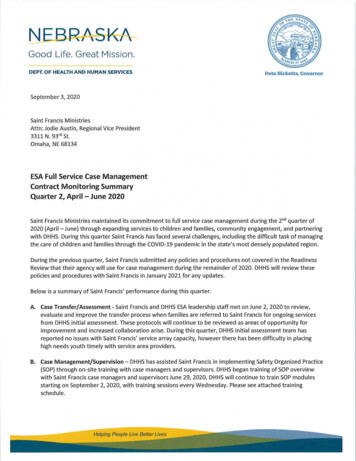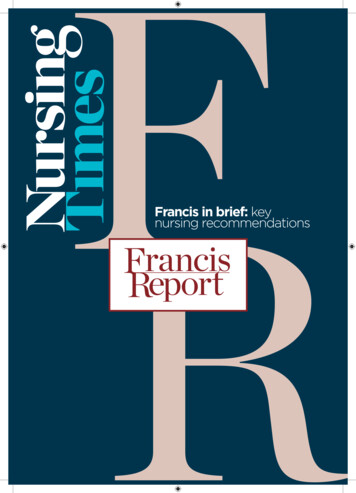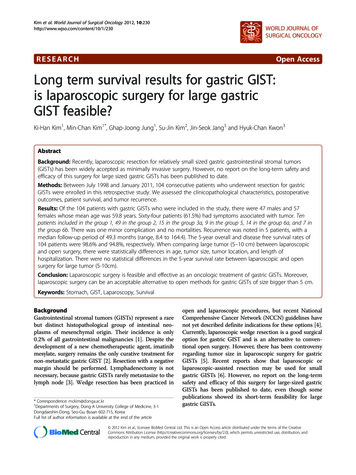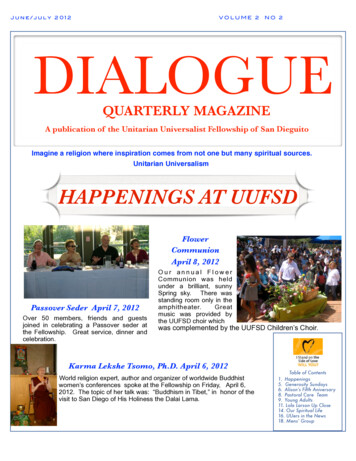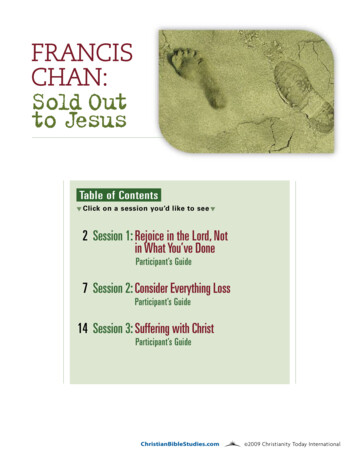
Transcription
FrancisChan:Sold Outto JesusTable of Contentsq Clickon a session you’d like to see q2 Session 1: Rejoice in the Lord, Notin What You’ve DoneParticipant’s Guide7 Session 2: Consider Everything LossParticipant’s Guide14 Session 3: Suffering with ChristParticipant’s GuideChristianBibleStudies.com 2009 Christianity Today International
LEADER’S GUIDESession 1Rejoice inthe Lord,Not in WhatYou’ve DoneThe surpassing greatness ofChrist is worth our everything.Philippians 3:10 shows usthat fellowship with ChristNote To Leader: Provide each person with theParticipant’s Guide included at the end of this study.Open this session by reading Philippians 3:1–11and then showing the first video clip. Then ask thefollowing questions.often comes through suffering.Although we tend to seesuffering as a bad thing, thispassage shows that it canAs a group,watch clip one.After the clip is finished, discussthe following questions together.actually be a blessing. Aswe are consumed by Jesusand Jesus alone, we beginto understand what reallymatters in life.Part OneIdentify the IssueScripture: Philippians 3:1–11[Q] What would your life look like if you were obsessedFeaturing: The sermon “Living[Q] Give an example of when you or someone you knowwith Jesus,” by Francis Chan,PreachingToday.comwith Jesus?rejoiced in the Lord, even when things weren’t goingwell.[Q] Those Paul talked about in Philippians 3 felt thatcircumcision was the way to find acceptance withGod. What might be a modern-day example ofsomething we do to try to find acceptance with God?ChristianBibleStudies.com 2009 Christianity Today International
Session 1: Leader’s Guide Rejoice in the Lord, Not in What You’ve Done 3[Q] Should we ever feel pleased with ourselves spiritually? Why or why not?Teaching Point One: Rejoice in the Lord.We rarely hear the word rejoice outside of Christian circles. It’s not a concept that most peoplecan relate to. A person usually talks about being happy or maybe even feeling joy, but few peoplesay they rejoiced about something. And even if they did say that, it’s usually when somethinggood has happened—something that is going their way.But Paul told the Philippians to rejoice in the Lord (3:1). He knew they, like most of theChristians in the early churches, would suffer persecution and trouble for their faith. Regardlessof what they were going through, he wanted them to rejoice. Read 1 Thessalonians 5:16–24.[Q] What do you think Paul meant when he said to “rejoice always”? What would that look likein your life?[Q] What about “praying without ceasing”? How are we supposed to do that?[Q] Give an example of something you could thank God for right now, even though it seemshard to you.Teaching Point Two: Don’t trust in your own goodness to gain acceptancewith God.Those Paul was talking about in Philippians 3 felt that everyone should be circumcised in orderto find acceptance with God. He not only warned his readers about these teachers, but calledthem dogs and evil workers. He clearly felt that anyone who listened to them would be led astray.Read Romans 2:25–29.[Q] According to verse 25, what is wrong with trusting in circumcision for acceptance withGod?Leader’s Note: Since circumcision is part of the Old Testament law, it would buy usacceptance if we kept all the rest of the law. But we fail in this regard, so it becomesworthless. Eugene Peterson puts it this way, “Circumcision is great if you live inaccord with God’s law. But if you don’t, it’s worse than not being circumcised. Betterto keep God’s law uncircumcised than break it circumcised.”ChristianBibleStudies.com 2009 Christianity Today International
Session 1: Leader’s Guide Rejoice in the Lord, Not in What You’ve Done 4[Q] What ways do you trust in something you’ve done to gainacceptance with God?[Q] What is the circumcision of the heart that Paul talks aboutin verse 29?[Q] Read Galatians 6:15. What new creation is he referring to?[Q] Francis Chan says, “We are the true circumcision, the realthing—we who worship by the Spirit of God.” What do youthink it means to worship by the Spirit of God?[Q] Chan also said, “True followers of God are the ones who trustin him, the ones who glory in what he has done.” What aresome practical ways we can glory in what God has done?[Q] What warning signs do you notice in your life when you arebecoming spiritually proud?[Q] How can we stay humble and grateful to God?Optional ActivityConsiderdoing this activityduring your timetogetherd Purpose:To help you think throughyour personality type so thatyou can figure out where youmight be tempted to becomespiritually proud.d Activity:Tami Rudkin asks thefollowing question onSmallGroups.com: Which ofthe following colorful nameswould best describe yourpersonality? Why?Gung Ho! GregoryPart TwoApply Your FindingsFrancis Chan said, “The real followers of Yahweh put no confidencein the flesh.” This is clear throughout the Book of Philippians.Action Point: Set aside time this week to read throughthe entire Book of Philippians. As you read, write down allSlow as a herd of turtles SamNervous NellieSharp as a tack ShaneSparkplug SallyDancin’ DinaBetter Late than Never Billthe ways we are told to trust in God rather than our ownDevoted Danstrength and wisdom.Passionate PatsySteady Stan—Study by JoHannah ReardonHilarious HannaStudious SaraShare your answer with thegroup and name one way youcould be tempted to becomespiritually proud.ChristianBibleStudies.com 2009 Christianity Today International
PARTICIPANT’S GUIDESession 1Rejoice inthe Lord,Not in WhatYou’ve DoneThe surpassing greatness ofChrist is worth our everything.Philippians 3:10 shows usthat fellowship with Christoften comes through suffering.Although we tend to seesuffering as a bad thing, thispassage shows that it canPart OneIdentify the IssueTeaching Point One: Rejoice in the Lord.Teaching Point Two: Don’t trust in your owngoodness to gain acceptance with God.actually be a blessing. Aswe are consumed by Jesusand Jesus alone, we beginto understand what reallymatters in life.Scripture: Philippians 3:1–11Featuring: The sermon “Livingwith Jesus,” by Francis Chan,PreachingToday.comChristianBibleStudies.com 2009 Christianity Today International
Session 1: Participant’s Guide Rejoice in the Lord, Not in What You’ve Done 6Optional ActivityConsiderdoing this activityduring your timetogetherd Purpose:To help you think throughyour personality type so thatyou can figure out where youmight be tempted to becomespiritually proud.d Activity:Part TwoApply Your FindingsFrancis Chan said, “The real followers of Yahweh put no confidencein the flesh.” This is clear throughout the Book of Philippians.Action Point: Set aside time this week to read throughthe entire Book of Philippians. As you read, write down allthe ways we are told to trust in God rather than our ownstrength and wisdom.—Study by JoHannah ReardonTami Rudkin asks thefollowing question onSmallGroups.com: Which ofthe following colorful nameswould best describe yourpersonality? Why?Gung Ho! GregorySlow as a herd of turtles SamNervous NellieSharp as a tack ShaneSparkplug SallyDancin’ DinaBetter Late than Never BillDevoted DanPassionate PatsySteady StanHilarious HannaStudious SaraShare your answer with thegroup and name one way youcould be tempted to becomespiritually proud.ChristianBibleStudies.com 2009 Christianity Today International
LEADER’S GUIDESession 2ConsiderEverythingLossNothing in this worldcompares to knowing andwalking with Jesus.Not only does Paul counthis lineage as loss, hecounts everything as loss.Note To Leader: Provide each person with theParticipant’s Guide included at the end of this study.Open this session by reading Philippians 3:3–9 and thenshowing the second video clip. Then ask the followingquestions.Why? Because he knowsthat nothing compares tothe surpassing greatnessof knowing Jesus. Christ’sAs a group, watch clip two.greatness is so wonderfulAfter the clip is finished, discussthe following questions together.Paul says he was willing tosuffer the loss of everything.Then Paul goes a step further.He writes, “I consider themrubbish, that I may gainChrist.”Scripture: Philippians 3:1–11Featuring: The sermon “Livingwith Jesus,” by Francis Chan,PreachingToday.comPart OneIdentify the Issue[Q] What parts of your life do you consider loss sincebecoming a Christian? In other words, what wasimportant to you before that no longer seemsimportant?[Q] Have you always been a church attender? If so, whendid church become more meaningful for you?u Ifnot, when did you become a church attenderand why?ChristianBibleStudies.com 2009 Christianity Today International
Session 2: Leader’s Guide Consider Everything Loss 8[Q] Francis Chan doesn’t like the translation “rubbish” in verse 8. What other words could weuse in its place?Teaching Point One: Put no hope in your spiritual achievements.Johnny V. Miller shares the following from his sermon, “The Great Rescue,” (PreachingToday.com):When I was a teenager, I became fascinated, appalled, and grieved by the literature of theHolocaust One scene that haunts me is a picture from Auschwitz. Above the entryway tothe concentration camp were the words, Arbeit macht frei. The same thing stood above thecamp at Dachau. It means, “work makes free”—work will liberate you and give you freedom.It was a lie—a false hope. The Nazis made the people believe hard work would equalliberation, but the promised “liberation” was horrifying suffering and even death.Arbeit macht frei. One reason that phrase haunts me is because it is the spiritual lie of thisage. It is a satanic lie. It’s a religious lie. It is a false hope—an impossible dream for manypeople in the world. They believe their good works will be great enough to outweigh their badworks, allowing them to stand before God in eternity and say, “You owe me the right to enterinto your heaven.”It is the hope of every false religion—arbeit macht frei. But it’s the love of God that liberates.It’s the blood of Jesus Christ that liberates. He died in my place, and I am free.[Q] Many of us have cut our Christian teeth on the fact that we are saved by grace, not byworks (Eph. 2:8–9), but sometimes it’s hard to remember that as we begin serving Christin the church. What are some ways you feel that you are trying to earn God’s approval?[Q] How can we find balance and a proper attitude in our serving?u Whatdo you think Paul would have said about that (Phil. 3:9–10)?[Q] What is the difference between working for a spiritual reward in heaven and working forspiritual recognition on earth? How can you tell the difference in your own life?Teaching Point Two: The Christian life is about knowing Jesus, notgetting something from him.In his book The Prodigal God, best-selling author and pastor Timothy Keller offers the followingstory to illustrate our teaching point:ChristianBibleStudies.com 2009 Christianity Today International
Session 2: Leader’s Guide Consider Everything Loss 9Once upon a time there was a gardener who grew an enormous carrot. So he took it to his kingand said, “My Lord, this is the greatest carrot I’ve ever grown or ever will grow. Therefore Iwant to present it to you as a token of my love and respect for you.” The king was touched anddiscerned the man’s heart, so as [the gardener] turned to go the king said, “Wait! You are clearlya good steward of the earth. I own a plot of land right next to yours. I want to give it to you freelyas a gift so you can garden it all.” And the gardener was amazed and delighted and went homerejoicing. But there was a nobleman at the king’s court who overheard all this. And he said, “My!If that is what you get for a carrot—what if you gave the king something better?” So the nextday the nobleman came before the king and he was leading a handsome black stallion. He bowedlow and said, “My lord, I breed horses and this is the greatest horse I have ever bred or everwill. Therefore I want to present it to you as a token of my love and respect for you.” But theking discerned his heart and said thank you, and took the horse and merely dismissed him. Thenobleman was perplexed. So the king said, “Let me explain. That gardener was giving me thecarrot, but you were giving yourself the horse.” 1[Q] What are some ways that we try to manipulate God to do what we want?Read Luke 14:25–33.[Q] What do you think Jesus meant when he said we must hate father, mother, wife, and childrento be his disciples?The following account from Christian History magazine may best illustrate this:In Naples, Thomas [Aquinas] possessed his own residence, his own retinue, and a host ofservants. With plumes and flowing silks, he took up riding on horseback around the bay.He visited the Blue Grotto and Capri. He had a taste for beauty and liked to repeat Augustine’ssaying: “If the work of His hands be so lovely, O how much more beautiful must be He who madethem.” Then quite suddenly, saying nothing to his parents, he embraced the Dominican Order ofPreachers, put on their white and black habit, and announced that his titles were henceforth inabeyance. He seemed hardly aware of the furor that would inevitably arise from his action.His mother complained to the Pope and the Archbishop of Naples. He had been a prince and wasnow vowed to mendicancy as a wandering friar, and he did not care. The Pope offered to makehim Lord Abbot of Montecassino with the privilege of wearing his Dominican habit. He refusedand wandered alone to Rome. His mind was made up.1Timothy Keller, The Prodigal God (Dutton, 2008), pp. 60-61.ChristianBibleStudies.com 2009 Christianity Today International
Session 2: Leader’s Guide Consider Everything Loss 10Years afterwards, when he came to write the SummaTheologica, he wrote beneath the question: “Whether dutiestoward parents are to be set aside for the sake of religion?” theOptional Activitysimple answer: “Whoever loves father or mother more thanMe is not worthy to follow Me,” and he quoted from Jerome’sfamous letter to Heliodorus: “Though your father fling himselfdown on the doorstep, trample him underfoot, go your way andfly with dry eyes to the standard of the Cross.”2[Q] What do you think it means to carry our cross (v. 27)?[Q] What do our lives look like when we “give up everything”(v. 34)? Explain your answer.u Sellall our possessions and live in poverty.u Giveaway most of our money—keep the bareminimum to live on.u Bewilling to give up everything if Christ calls us to.u Treatour possessions as if they are borrowed, ratherthan our own.u Other.[Q] Francis Chan says, “We have found a treasure in a field sowonderful that we can hardly believe it. We say, ‘Are youtelling me I can have a relationship with the Creator of theuniverse? That he’ll forgive me of everything I’ve ever done?That he’ll welcome me into this eternal kingdom? Give it tome! Give it to me, and take everything else!’” In what waysdo you feel you’ve experienced this?u Inwhat ways have you failed to experience this?[Q] Chan also said, “I want to know the power of Jesus’resurrection.” What areas of your life do you need to haveConsiderdoing this activityduring your timetogetherd Purpose:To help us see how we canapply the power of theresurrection to thecircumstances of life.d Activity:Explain to each of thepeople below how thepower of the resurrectioncan help them in theirpresent circumstances: Nora has never feltloved, so she isalways looking for the“perfect” friend, bothmale and female.Everyone disappointsher. Mason can’t find a job,even though he’sapplied for many. He’sstarting to feel it willnever happen. Pamela feels called tomissions, but she can’tstand the thought ofraising support.the power of his resurrection?2Robert Payne, The Fathers of the Western Church (Viking, 1951). As seen in “Left Behind,” Christian History (Issue 73), p.11ChristianBibleStudies.com 2009 Christianity Today International
Session 2: Leader’s Guide Consider Everything Loss 11Part TwoApply Your FindingsFrancis Chan said, “People are coming to church in droves, thinking, I’ll take Jesus if he’llmake me rich. I’ll take Jesus if I get to keep all the things I have. I’ll take Jesus if I get tomaintain this lifestyle. I’ll take Jesus if I get to hold on to some of these sins, these immoralrelationships. I’ll take Jesus if I can still be popular, still have this, still have that.”Action Point: Set aside time this week to think about which of these “I’ll take Jesusif ” statements you may be making. Then look up what Scripture has to say on thattopic, using a concordance or BibleGateway.com and ask God to make you willing totake Jesus no matter what.1—Study by JoHannah ReardonSkye Jethani, The Divine Commodity (Zondervan, 2009), pp. 113–114.ChristianBibleStudies.com 2009 Christianity Today International
PARTICIPANT’S GUIDESession 2ConsiderEverythingLossNothing in this worldcompares to knowing andwalking with Jesus.Part OneNot only does Paul countIdentify the Issuehis lineage as loss, hecounts everything as loss.Why? Because he knowsthat nothing compares tothe surpassing greatnessof knowing Jesus. Christ’sTeaching Point One: Put no hope in yourspiritual achievements.Teaching Point Two: The Christian life is aboutknowing Jesus, not getting something fromhim.greatness is so wonderfulPaul says he was willing tosuffer the loss of everything.Then Paul goes a step further.He writes, “I consider themrubbish, that I may gainChrist.”Scripture: Philippians 3:1–11[Q] What do our lives look like when we “give upeverything” (v. 34)? Explain your answer.u Sellall our possessions and live in poverty.u Giveaway most of our money—keep the bareminimum to live on.u Bewilling to give up everything if Christ callsus to.u TreatFeaturing: The sermon “Livingwith Jesus,” by Francis Chan,our possessions as if they are borrowed,rather than our own.u Other.PreachingToday.comChristianBibleStudies.com 2009 Christianity Today International
Session 2: Participant’s Guide Consider Everything Loss 13Part TwoApply Your FindingsFrancis Chan said, “People are coming to church in droves, thinking, I’ll take Jesus if he’llmake me rich. I’ll take Jesus if I get to keep all the things I have. I’ll take Jesus if I get tomaintain this lifestyle. I’ll take Jesus if I get to hold on to some of these sins, these immoralrelationships. I’ll take Jesus if I can still be popular, still have this, still have that.”Action Point: Set aside time this week to think about which of these “I’ll take Jesusif ” statements you may be making. Then look up what Scripture has to say on thattopic, using a concordance or BibleGateway.com and ask God to make you willing totake Jesus no matter what.—Study by JoHannah ReardonChristianBibleStudies.com 2009 Christianity Today International
LEADER’S GUIDESession 3Sufferingwith ChristWe never want to think aboutthis part of the Christian life.Philippians 3:10 shows us thatfellowship with Christ oftencomes through suffering.Although we tend to seeNote To Leader: Provide each person with theParticipant’s Guide included at the end of this study.Open this session with the third video clip. Then ask thefollowing questions.suffering as a bad thing, thispassage shows that it canactually be a blessing. Aswe are consumed by JesusAs a group, watch clipthree. After the clip is finished,discuss the following questionstogether.and Jesus alone, we beginto understand what reallymatters in life.Scripture: Philippians 3:1–11Featuring: The sermon “LivingPart OneIdentify the Issue[Q] Francis Chan said, “At that time the church waswith Jesus,” by Francis Chan,creating a new brand of Christianity that said youPreachingToday.comcould call yourself a Christian or a follower of Jesuswithout necessarily having to follow him—thatsomehow you could be a follower of Christ and yetlook nothing like him.” Were those the terms youcame to Christ on? If so, has anything happened sinceyou came to Christ to challenge that conception?ChristianBibleStudies.com 2009 Christianity Today International
Session 3: Leader’s Guide Suffering with Christ 15[Q] Chan asks, “Can you imagine that type of intimacy with Jesus? As someone hammers a nailinto his hands and he’s screaming, and then they do it to you, can you imagine looking ateach other? Can you imagine the fellowship of sharing in that type of suffering together?”How would you answer his questions?[Q] Chan also tells the story of Bruce Olsen, the missionary whose life was threatened. Olsensaid that he experienced the cross like never before—like there was a fellowship beingshared that could only happen in suffering. Have you ever experienced such fellowshipwith Jesus when you’ve gone through something difficult? If so, tell us about it.[Q] Do you think we should ask for suffering? Why or why not?Teaching Point One: Learn from Shadrach, Meshach, and Abednego.Besides Daniel, three young men came in captivity from Judah to Babylon. Everything they hadknown was destroyed, including the temple where they worshiped God. All seemed to be lost,but they refused to compromise their beliefs. Read Daniel 3.[Q] What strikes you most about this story?[Q] Can you think of any modern equivalents to what Shadrach, Meshach, and Abednegoexperienced?[Q] What can you take away from this story to apply to your life?Teaching Point Two: Learn from Stephen.Stephen was a deacon in the early church. He was declared “full of faith and the Holy Spirit” andchosen to help feed the hungry (Acts 6:5). But God had even more in mind for him. Read Acts6:8–7:3 and 7:48–60.[Q] What impresses you about Stephen’s life and death?[Q] Can you think of any modern equivalents to Stephen?[Q] What can you take away from his story to apply to your life?ChristianBibleStudies.com 2009 Christianity Today International
Session 3: Leader’s Guide Suffering with Christ 16Part TwoApply Your FindingsFrancis Chan said, “We need to be honest with God. It’s not like we’re going to trick him! Maybewe need to start with this prayer: God, I actually like Jesus. I want some more Jesus, butnot to the point of suffering. Be honest and tell him that. Tell him that’s not your heart rightnow, but that you would like to be that obsessed with Jesus. Tell him you’re not there yet. Tellhim you don’t want Christ’s suffering. Tell him you don’t want his sacrifice. Tell him you don’twant his poverty. Tell him you don’t want his persecution. Tell him you want the crown of goldwithout the crown of thorns. Tell him you want to know the power of his resurrection, but thatyou want to skip the suffering part. But then tell him that you know that’s not right. Tell himthat you want to be consumed with Christ, and you believe he’s better than your comfort. Andsomeday soon, maybe you’ll be at the point where you come before God and pray, God, I believethere is more of you to experience throughsuffering. I know that once the sufferingcomes, I won’t enjoy it as much as I thoughtI might. But I don’t want to end my life socomfortably. I want to know Christ. I wantto know his power, and I want to know hisOptionalActivitysuffering. I want to somehow attain the powerof resurrection. I want it all. I want everythingof Jesus.”Action Point: Set aside time this weekto pray what Francis Chan suggests in theparagraph above. And after you’ve spenttime praying about it, get together with afriend and talk about your struggles andencouragements in praying this way.—Study by JoHannah ReardonConsiderdoing this activityduring your timetogetherd Purpose:To help us think about what hinders our walkwith Christ.d Activity:Provide everyone with pen and paper. Ask them towrite down three things that they would most havetrouble living without. It can be material things,such as a car or house. Or it can be recreationalthings such as watching sports, movies, or readingbooks. It could be relationships, such as a goodfriend, spouse, or child.When they’ve completed their list, ask them if anyof those things are hindering their walk with Christ.Are any of those things harder to give up than theirrelationship with Christ? If so, ask them to spendtime grappling with that this week.ChristianBibleStudies.com 2009 Christianity Today International
PARTICIPANT’S GUIDESession 3Sufferingwith ChristWe never want to think aboutthis part of the Christian life.Philippians 3:10 shows us thatfellowship with Christ oftencomes through suffering.Although we tend to seesuffering as a bad thing, thispassage shows that it canactually be a blessing. Aswe are consumed by Jesusand Jesus alone, we beginto understand what reallymatters in life.Scripture: Philippians 3:1–11Part OneIdentify the IssueTeaching Point One: Learn from Shadrach,Meshach, and Abednego.Teaching Point Two: Learn from Stephen.Part TwoApply Your FindingsFrancis Chan said, “We need to be honest with God. It’snot like we’re going to trick him! Maybe we need to startwith this prayer: God, I actually like Jesus. I want someFeaturing: The sermon “Livingmore Jesus, but not to the point of suffering. Be honestwith Jesus,” by Francis Chan,and tell him that. Tell him that’s not your heart right now,PreachingToday.combut that you would like to be that obsessed with Jesus. Tellhim you’re not there yet. Tell him you don’t want Christ’ssuffering. Tell him you don’t want his sacrifice. Tell himyou don’t want his poverty. Tell him you don’t want hispersecution. Tell him you want the crown of gold withoutthe crown of thorns. Tell him you want to know the powerof his resurrection, but that you want to skip the sufferingChristianBibleStudies.com 2009 Christianity Today International
Session 3: Participant’s Guide Suffering with Christ 18part. But then tell him that you know that’s not right. Tell him that you want to be consumed withChrist, and you believe he’s better than your comfort. And someday soon, maybe you’ll be at thepoint where you come before God and pray, God, I believe there is more of you to experiencethrough suffering. I know that once the suffering comes, I won’t enjoy it as much as I thought Imight. But I don’t want to end my life so comfortably. I want to know Christ. I want to know hispower, and I want to know his suffering. I want to somehow attain the power of resurrection. Iwant it all. I want everything of Jesus.”Action Point: Set aside time this week to pray what Francis Chan suggests in theparagraph above. And after you’ve spent time praying about it, get together with afriend and talk about your struggles and encouragements in praying this way.—Study by JoHannah ReardonChristianBibleStudies.com 2009 Christianity Today International
God. What might be a modern-day example of . One reason that phrase haunts me is because it is the spiritual lie of this age. It is a satanic lie. It's a religious lie. It is a false hope—an impossible dream for many . In his book The Prodigal God, best-selling author and pastor Timothy Keller offers the following

